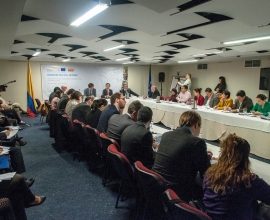The country meeting in Colombia highlights the level of results obtained and the commitment to the second phase of EUROsociAL
This was expressed by the Colombian institutions participating in this pilot meeting organised jointly by APC-Colombia, FIIAPP, IILA, CISP and the European Union Delegation in Colombia
The Colombia country meeting held in Bogotá on 3rd March evidenced the broad participation of EUROsociAL in the country, the translation of this contribution into results, and the interest that exists in working again with the Programme, in its next phase, as an important actor in support of national policies. This was expressed by the Colombian institutions participating in this pilot meeting organised jointly by APC-Colombia, FIIAPP, IILA, CISP and the European Union Delegation in Colombia.
This country meeting is the first of a series of seven events in Latin America, and the members of the inaugural table included Alejandro Gamboa, Director of APC-Colombia, who encouraged his country's institutions “to reflect on the advances of this programme in social cohesion”, a sentiment echoed by his colleagues throughout the day. He was accompanied by José Luis de Francisco, head of cooperation of the European Union Delegation in Colombia, who highlighted EUROsociAL as “a different mode of cooperation which takes advantage of the context in which it operates”; and Francesco Chiodi, the programme's coordinator of social policy and employment, who indicated that “EUROsociAL has leveraged European and Latin American expertise by following a peer-to-peer cooperation methodology that is also used among European Union countries”. Carlos Tassara, a public policy expert from CISP, completed the table and acted as the chair.
In terms of Colombian institutions, a large contingent was present in the morning and afternoon at the meeting held in the northern section of Bogotá. Secretariat of Transparency, National Planning Department, Administrative Department for Social Prosperity, Colombian Family Welfare Institute, National Agency for Overcoming Extreme Poverty, Office of the Attorney General of the Nation, Ministry of Justice and Law, Ministry of Health and Social Protection, National Education Ministry, Ministry of Finance and Public Credit, Ministry of Labour, Public Employment Service, Directorate of National Taxes and Customs, National Penitentiary and Prison Institute, High Council for Women's Equality, Directorate of Gender Equality of the Ministry of Agriculture, and representatives of the Office of the Presidency of the Republic. Other participants included the Spanish and Italian embassies and the programme's operational partners, Expertise France, IJJO and OEI.
In addition to attending, the representatives of these institutions participated actively in the ensuing debate and dialogue, from which three headlines might be taken: the important results achieved with EUROsociAL that were shared there, the desire to continue cooperating with the programme, and the incorporation of some new aspects, such as support in implementation, territorialisation of actions, work with civil society, and the gender perspective (precisely an aspect contemplated in the upcoming phase).
EUROsociAL, a programme financed by the European Union, will continue learning the impressions of the different stakeholders who participated in this second phase of the Programme in another six countries, with Peru being the next stop (Lima, 15th March), followed by Paraguay (Asunción, 18th March) and Costa Rica (San José, 31st March). The country meetings of Honduras (Tegucigalpa, 5th April), El Salvador (San Salvador, 13th April) and Ecuador (Quito, 18th April) will be held in April.
Further information on the event:
FIIAPP

